Jules Chauvet, Le Vin en Question (Wine in Question)
Price includes delivery in the Republic of Ireland - Delivery outside of Ireland available: Please contact us.
An Interview with Hans Ulrich Kesselring. English version at the end of the book. (English version at the end of the book)
Here is the complete text of an interview of Jules Chauvet conducted in 1981 by the Swiss winemaker Hans Ulrich Kesselring. The transcript of this exchange was published in the form of a written dialogue for the first time in 1998 by publisher Jean-Paul Rocher. This book being no longer available, the present volume constitutes a new edition and the first in the “ Jules Chauvet ” collection launched by Les éditions de l’Épure / Marie Rocher, to ensure that the ideas of Jules Chauvet - which have already inspired numerous winemakers, oenologists, scientists, and more - may continue to be read, to be known and to pose us questions. English translation by Aaron Ayscough
'You might, however, be posing yourself the same question a young Italian food journalist friend asked, when I handed him a copy of the book last night: “Who’s Jules Chauvet?”
Chauvet was a Beaujolais wine dealer, winemaker, and wine scientist, who throughout the 1980s mentored the Morgon vigneron Marcel Lapierre and his collaborator Jacques Néauport, prefiguring many of today’s ideas about natural wine. He’s memorably profiled in the Beaujolais chapter of Kermit Lynch‘s classic Adventures on the Wine Route. Nonetheless, if you’ve ever wondered quite what the Chauvet fuss was about, you’re not alone. His wines, released as Chauvet Frères, have become indescribably rare since his death in 1989. Even in France, where he lived and worked his entire life, Chauvet is sufficiently shrouded in mystery to inspire one French blogger to satirically suggest he never existed.
Chauvet’s original books, published posthumously throughout the 1990s and 2000s by the late Paris publisher Jean-Paul Rocher (Marie’s father), are long out of print, and were never easy reads to begin with, even for French speakers. Chauvet’s delicate turns of phrase and his authoritative command of the subject are unmistakable. But the works were marred by repetition among the different volumes, and peculiar editorial decisions, like the one to preserve the “hemming and hawing,” “unfinished sentences,” and “awkward phrasing” in the first edition of Wine in Question.' Aaron Ayscough




